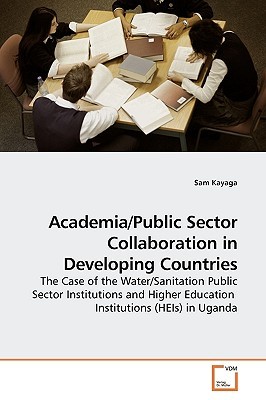
- We will send in 10–14 business days.
- Author: Sam Kayaga
- Publisher: VDM Verlag
- ISBN-10: 3639196740
- ISBN-13: 9783639196740
- Format: 15.2 x 22.9 x 0.4 cm, minkšti viršeliai
- Language: English
- SAVE -10% with code: EXTRA
Academia/Public Sector Collaboration in Developing Countries (e-book) (used book) | bookbook.eu
Reviews
Description
Capacity of public sector staff in developing countries is crucial for achieving the Millennium Development Goals. Literature from developed countries shows that higher education institutions (HEIs) play an important role in accelerating human resources development for industries, through continuous professional development. This book reports on research carried out to examine drivers and barriers of collaboration between the water/sanitation (WATSAN) public sector and HEIs in developing countries, using Uganda as a case study. Interviews were conducted in 2006 with 13 senior professionals from 10 water/sanitation sector institutions, and 12 senior academics from various departments in 4 HEIs. Results showed that most existing collaborations were initiated by individuals, were informal, weak and ad hoc. Yet, all the stakeholders interviewed perceived industry- HEI collaboration to be an important factor for the attainment of their common long-term goal: enhancing the welfare of society. Policy makers and managers need to make deliberate efforts to put in place mechanisms and incentives that will foster organisation-wide collaborations.
EXTRA 10 % discount with code: EXTRA
The promotion ends in 22d.05:14:51
The discount code is valid when purchasing from 10 €. Discounts do not stack.
- Author: Sam Kayaga
- Publisher: VDM Verlag
- ISBN-10: 3639196740
- ISBN-13: 9783639196740
- Format: 15.2 x 22.9 x 0.4 cm, minkšti viršeliai
- Language: English English
Capacity of public sector staff in developing countries is crucial for achieving the Millennium Development Goals. Literature from developed countries shows that higher education institutions (HEIs) play an important role in accelerating human resources development for industries, through continuous professional development. This book reports on research carried out to examine drivers and barriers of collaboration between the water/sanitation (WATSAN) public sector and HEIs in developing countries, using Uganda as a case study. Interviews were conducted in 2006 with 13 senior professionals from 10 water/sanitation sector institutions, and 12 senior academics from various departments in 4 HEIs. Results showed that most existing collaborations were initiated by individuals, were informal, weak and ad hoc. Yet, all the stakeholders interviewed perceived industry- HEI collaboration to be an important factor for the attainment of their common long-term goal: enhancing the welfare of society. Policy makers and managers need to make deliberate efforts to put in place mechanisms and incentives that will foster organisation-wide collaborations.


Reviews